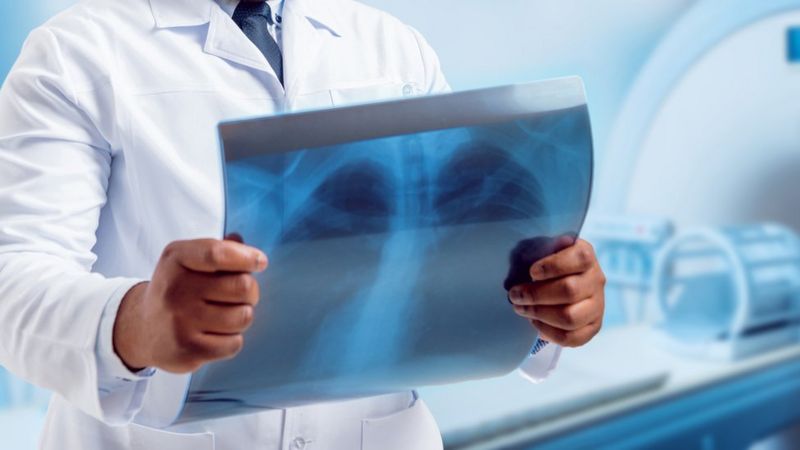A study of 10 patients at Oxford University used a novel scanning technique to identify damage not picked up by conventional scans.
It uses a gas called Xenon during MRI scans to create images of lung damage.
Lung experts said a test that could spot long-term damage would make a huge difference to Covid patients.
The Xenon technique sees patients inhale the gas during a magnetic resonance imaging (MRI) scan.
Prof Fergus Gleeson, who is leading the work, tried out his scanning technique on 10 patients aged between 19 and 69.
Eight of them had persistent shortness of breath and tiredness three months after being ill with coronavirus, even though none of them had been admitted to intensive care or required ventilation, and conventional scans had found no problems in their lungs.
The scans showed signs of lung damage - by highlighting areas where air is not flowing easily into the blood - in the eight who reported breathlessness.
The results have prompted Prof Gleeson to plan a trial of up to 100 people to see if the same is true of people who had not been admitted to hospital and had not suffered from such serious symptoms. He is planning to work with GPs to scan people who have tested positive for Covid-19 across a range of age groups.
Moving the goalposts
The aim is to discover whether lung damage occurs and if so whether it is permanent, or resolves over time.
He said: "I was expecting some form of lung damage, but not to the degree that we have seen."
The risk of severe illness and death increases markedly for the over 60s. But if the trial discovers that the lung damage occurs across a wider age group and even in those not requiring admission to hospital "it would move the goalposts," according to Prof Gleeson.
He believes the lung damage identified by the Xenon scans may be one of the factors behind long Covid, where people feel unwell for several months after infection.
The scanning technique was developed by a research group at the University of Sheffield led by Prof James Wild who said it offered a "unique" way of showing lung damage caused by Covid-19 infection and its after-effects.
"In other fibrotic lung diseases we have shown the methods to be very sensitive to this impairment and we hope the work can help understand Covid-19 lung disease."
Shelley Hayles is a GP based in Oxford involved in helping set up the trial. She believes that up to 10% of those who have had Covid-19 might have some form of lung damage which is leading to prolonged symptoms.
"We're now at more than one and a quarter million who have been infected - and 10% of that is a lot of people," she said.
"When medical staff tell patients that they don't know what's wrong with them and they don't know how to sort the symptoms out, it's very stressful.
"With most patients, even if the news isn't great, they want the diagnosis."
'I'd rather know'
That is true of Tim Clayden, who spent his 60th birthday at the John Radcliffe Hospital in Oxford with Covid symptoms that were so severe he believed that he would die. Fortunately he recovered but remains weary to this day. Tim was frustrated not knowing why he wasn't recovering to full health.
He said that he was simultaneously concerned and relieved when he received one of Prof Gleeson's scans which showed that his lungs were damaged.
"It does help knowing that there is an issue with your lungs," he says.
"I now know what it is. I know the origin of it. What I don't know, because no one does, is whether it is permanent or if it will pass. But I'd rather know than not know."
Dr Samantha Walker, director of research and innovation at Asthma UK and the British Lung Foundation, said: "This is an interesting investigation and it's important that post-Covid lung damage is looked into further and on a larger scale so we can better understand the longer term damage caused.
"If further investigation shows that lung damage occurs, it could enable the development of a test that can measure lung damage caused by Covid-19 which would make a huge difference to many people with 'long covid' respiratory issues and also allow specific treatments to be developed."

